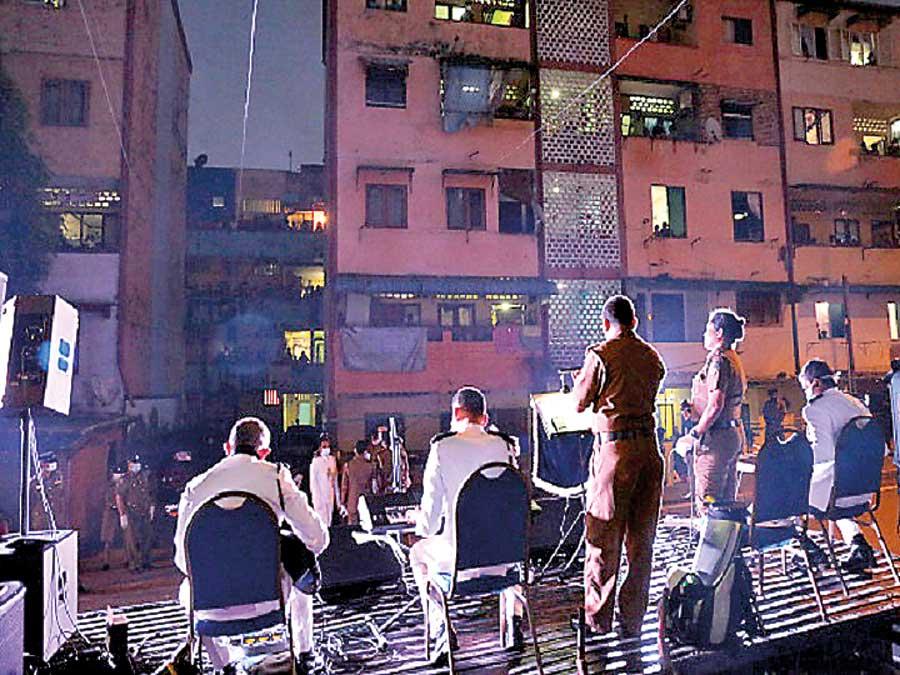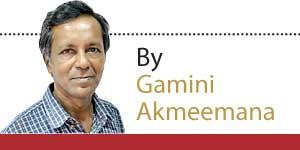Reply To:
Name - Reply Comment

Members of the Sri Lankan Police musical band perform in a bid to boost people's morale amid Coronavirus outbreak
- We haven’t used music as a therapeutic, healing process in face of dark depressions and increasingly bleak times
- When the pandemic hit the UK early in 2021, young musicians played in the streets to people trapped in their homes and apartments
- A crisis situation is used by the politicians to censor the arts
By now, some readers may take me for a classic grumbler. But the grumbling is not without reason. Last week, I wrote that reading habits haven’t gone up during the pandemic while that has been the case in many other countries, and that is true.
wrote that reading habits haven’t gone up during the pandemic while that has been the case in many other countries, and that is true.
This week, I write that we haven’t used music as a therapeutic, healing process in face of dark depressions and increasingly bleak times.
When the pandemic hit the UK early in 2021, young musicians played in the streets to people trapped in their homes and apartments. Now, the Guardian UK reports about how music is bringing together people ravaged by civil war in South Sudan.
But first, back to Sri Lanka. I listened to a lot of radio throughout the pandemic. This is nothing new, as I’ve always been a big radio fan. Presumably, radio was a big escape valve to many trapped in their homes during the pandemic. Most Lankan homes are crowded and over extended, and one can imagine the tensions under repeated lockdowns.
The radio stations played music (i.e. songs) day and night, in all three languages. But this is a big misconception. Music isn’t just songs. In any case, there was little or no music of any kind played live in the country apart from what radio and TV stations transmitted.
If you can’t hold concerts, small group or individual performances would have been possible. By the same token, if thousands were allowed to gather at public rallies, funerals, and elections as well as the Colombo international book fair, why not concerts? A crisis situation is used by the politicians to censor the arts.
Musicians and other artists are among the hardest hit by the pandemic. But music, like all other art forms, isn’t just about taking. It’s about giving. Musicians could have reached out to the people in their darkest hours. The Covid 19 bought out desperate needs – not just about food, or sustaining the body, but also about sustaining the mind. Music is a wonderful healer. The authorities should have considered allowing small groups of travelling musicians to perform all around the country, in cities, towns and villages. People could have listened or watched from their homes. If SLTB buses are commandeered for May Day rallies, they could have been utilised for this purpose, too.
Even without musicians, good music can be played from mobile platforms. I’m thinking of instrumental music, as well as classical music, eastern and western, rather than the ‘hit’ songs that our FM radio stations (and private buses) play endlessly, because the latter can lead to friction and argument about what is good and bad. Research in Western countries has clearly shown the stress-reducing value of good music aired in public transport, for example.
Radio stations could have aired accompanying programmes to explain things to those who are unfamiliar with such musical genres. If anyone wants to argue about this, all I can say is that we are a country of endless arguments, without anything getting effectively done. Can we ever agree on anything? I’m talking here about doing something therapeutic collectively to ease the psychological burden of being locked down, not personal glory and gain.
In many countries, the therapeutic value of music is understood better than in this country. Take South Sudan, a country which came into existence as an independent entity only in 2011, after almost four decades of bitter civil war against the government of Sudan, controlled by the northern part of the country. The fledgling nation understood the value of music and musicians from the start. When independence was formally declared on July 9, 2011, the national anthem had been chosen through a contest, and the winning song was composed by students and teachers from the department of music, university of Juba.
But all became chaos two years later when simmering tribal rivalries broke out between the two main ethnic groups Dinka and Nuer. People began fleeing to escape the fighting, and a new round of refugee camps began.
But displaced people began playing music in the refugee camps. According to Deng Nyalchyewk, an anthropologist who became a refugee but started a musical group in his camp, ‘everyone in South Sudan is a musician.’
He teaches the dances and rhythms of his Nuer people to children in the camp, adding: “Sometimes politics divides people, but culture unites them. We use songs to stop the young people reaching the empty spaces where you become a person with no historical background.”
In South Sudan today, one third of the population is displaced. Nyalchyewk believes that preserving the culture is crucial to creating a sense of unity among the country’s 60 different tribes.
There are others too, who believe in music’s healing power and ability to unite.
“Peace is not something we just talk about, but something we work for,” says Emmanuel Kembe, one of the country’s best known musicians, persecuted by the government because of his protest music. “This is not just another peace where we come to celebrate and then go. We still see people in the street begging, and this is not peace.”
Kembe has performed at Kakuma, Kenya, one of the world’s largest refugee camps. Rapper Johnson Mike spent his childhood in the camp and co-founded the Hip Hop Clinic, a group reacting to “everything around us that is wrong”. Mike grew up without his father who, like many men of his generation, fought during the civil war alongside John Garang, the Sudan People’s Liberation Army’s leader. Garang died in a helicopter crash shortly after he brokered the 2005 comprehensive peace agreement.
Complacency is the Sri Lanka’s biggest achille’s heel – we import almost everything we need, even frying pans, but we are ever so complacent that we do things better than most countries (like fighting civil wars and winning, forgetting that the winner may ‘take nothing’ in the long run). We believed ourselves immune to Coronavirus until the pandemic gripped us by the throat. During our own civil war, neither side used music as a bridge between communities, or to bring solace to refugees.
Hindi has always been the favourite ‘second languge’ of Sinhala music audiences. But Tamil film hits are now requested and played by young Sinhala audiences at DJ events. Today, Sinhala FM radio stations occasionally play a Tamil song, while some Tamil stations play bi-lingual baila hits by Sri Lankan Tamil artists. The Sinhala song is built upon the North Indian ‘raghadaree’ tradition. The Tamil song is sourced to South Indian Karnatic. But both popular Sinhala and Tamil songs aired by our radio stations today are strongly influenced by Western pop, rock, and hiphop.
The culture gap is not as wide as it used to be. It only remains for people to realise the power of music as a healing and bridge building tool. If people all over the world enjoy Western opera without understanding Italian, German or Russian, the Sinhalese and Tamils (and Muslims) can appreciate each other’s music despite language barriers. And, while we are at it, why not use songs as language teaching tools? It’s a safe bet students would no longer find language classes boring in that case.